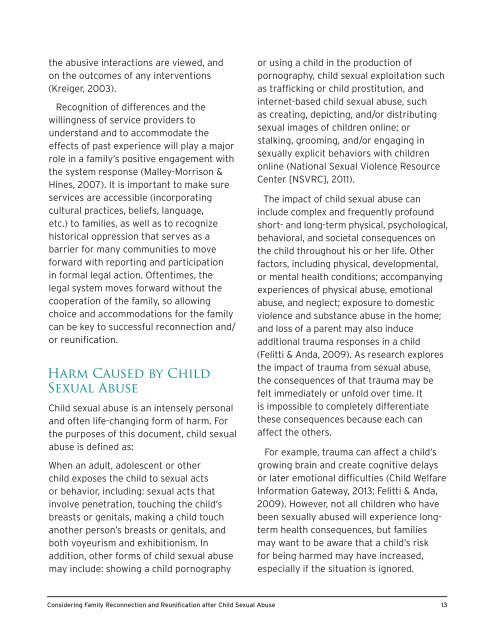Considering Family Reconnection and Reunification after Child Sexual Abuse
1VwGeds
1VwGeds
Create successful ePaper yourself
Turn your PDF publications into a flip-book with our unique Google optimized e-Paper software.
the abusive interactions are viewed, <strong>and</strong><br />
on the outcomes of any interventions<br />
(Kreiger, 2003).<br />
Recognition of differences <strong>and</strong> the<br />
willingness of service providers to<br />
underst<strong>and</strong> <strong>and</strong> to accommodate the<br />
effects of past experience will play a major<br />
role in a family’s positive engagement with<br />
the system response (Malley-Morrison &<br />
Hines, 2007). It is important to make sure<br />
services are accessible (incorporating<br />
cultural practices, beliefs, language,<br />
etc.) to families, as well as to recognize<br />
historical oppression that serves as a<br />
barrier for many communities to move<br />
forward with reporting <strong>and</strong> participation<br />
in formal legal action. Oftentimes, the<br />
legal system moves forward without the<br />
cooperation of the family, so allowing<br />
choice <strong>and</strong> accommodations for the family<br />
can be key to successful reconnection <strong>and</strong>/<br />
or reunification.<br />
Harm Caused by <strong>Child</strong><br />
<strong>Sexual</strong> <strong>Abuse</strong><br />
<strong>Child</strong> sexual abuse is an intensely personal<br />
<strong>and</strong> often life-changing form of harm. For<br />
the purposes of this document, child sexual<br />
abuse is defined as:<br />
When an adult, adolescent or other<br />
child exposes the child to sexual acts<br />
or behavior, including: sexual acts that<br />
involve penetration, touching the child’s<br />
breasts or genitals, making a child touch<br />
another person’s breasts or genitals, <strong>and</strong><br />
both voyeurism <strong>and</strong> exhibitionism. In<br />
addition, other forms of child sexual abuse<br />
may include: showing a child pornography<br />
or using a child in the production of<br />
pornography, child sexual exploitation such<br />
as trafficking or child prostitution, <strong>and</strong><br />
internet-based child sexual abuse, such<br />
as creating, depicting, <strong>and</strong>/or distributing<br />
sexual images of children online; or<br />
stalking, grooming, <strong>and</strong>/or engaging in<br />
sexually explicit behaviors with children<br />
online (National <strong>Sexual</strong> Violence Resource<br />
Center [NSVRC], 2011).<br />
The impact of child sexual abuse can<br />
include complex <strong>and</strong> frequently profound<br />
short- <strong>and</strong> long-term physical, psychological,<br />
behavioral, <strong>and</strong> societal consequences on<br />
the child throughout his or her life. Other<br />
factors, including physical, developmental,<br />
or mental health conditions; accompanying<br />
experiences of physical abuse, emotional<br />
abuse, <strong>and</strong> neglect; exposure to domestic<br />
violence <strong>and</strong> substance abuse in the home;<br />
<strong>and</strong> loss of a parent may also induce<br />
additional trauma responses in a child<br />
(Felitti & Anda, 2009). As research explores<br />
the impact of trauma from sexual abuse,<br />
the consequences of that trauma may be<br />
felt immediately or unfold over time. It<br />
is impossible to completely differentiate<br />
these consequences because each can<br />
affect the others.<br />
For example, trauma can affect a child’s<br />
growing brain <strong>and</strong> create cognitive delays<br />
or later emotional difficulties (<strong>Child</strong> Welfare<br />
Information Gateway, 2013; Felitti & Anda,<br />
2009). However, not all children who have<br />
been sexually abused will experience longterm<br />
health consequences, but families<br />
may want to be aware that a child’s risk<br />
for being harmed may have increased,<br />
especially if the situation is ignored.<br />
<strong>Considering</strong> <strong>Family</strong> <strong>Reconnection</strong> <strong>and</strong> <strong>Reunification</strong> <strong>after</strong> <strong>Child</strong> <strong>Sexual</strong> <strong>Abuse</strong> 13


